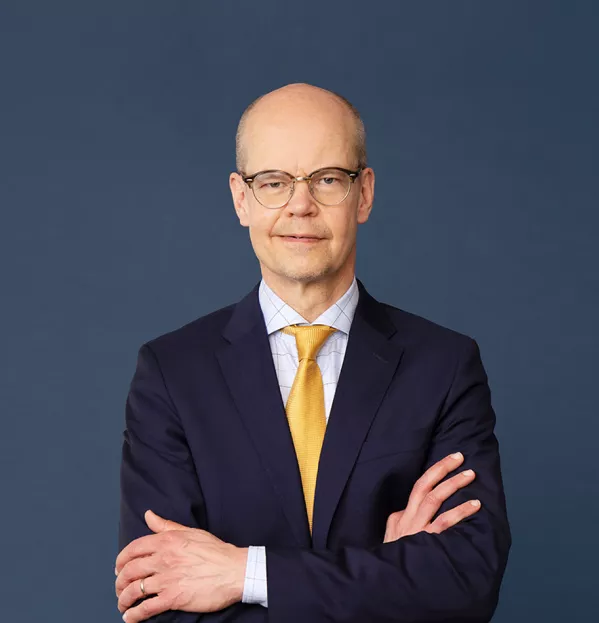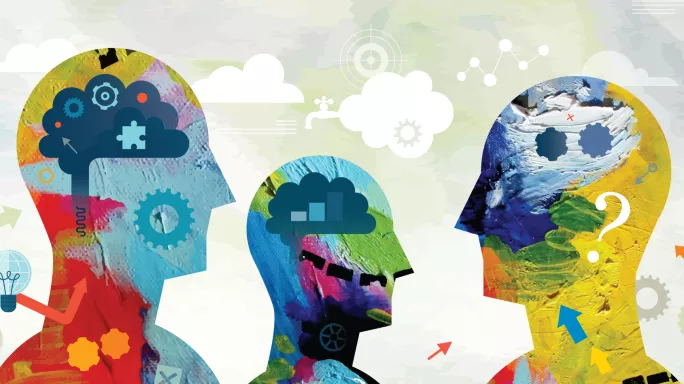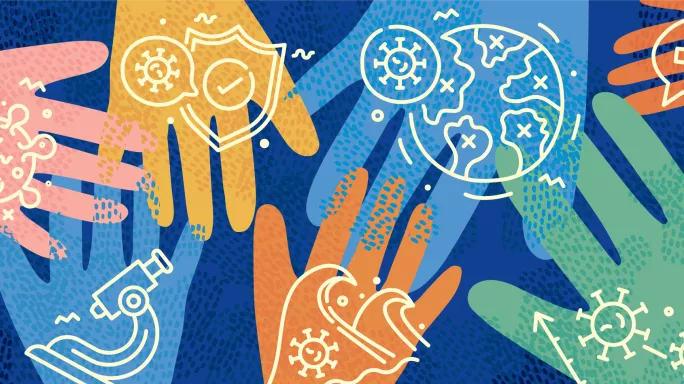- Home
- Analysis
- Specialist Sector
- The man helping the IB find its voice
The man helping the IB find its voice

The Crown may not sound like an obvious source of inspiration for leading a global education organisation through a pandemic and into a rapidly changing world. But for Olli-Pekka Heinonen, director-general of the International Baccalaureate (IB), looking back over history is something he has been doing a lot since he started the job in May 2021 - only the eighth director-general in the organisation’s 53-year history.
“Part of the learning process I went through was to think about the future by looking to history - I wanted to understand what was in the minds of the people who created the organisation more than 50 years ago,” he tells Tes.
Which is why, when he was unwinding by watching television over the holidays, he drifted towards The Crown.
“[It] is a description of those times when the IB was created - it was good to have the possibility to reflect on the circumstances of those times,” he explains.
- Covid disruption: IB to repeat dual assessment approach
- IB: 70 per cent of schools using controversial 2021 exams
- Change: How Covid is reshaping international education
What this reflection led him to realise was how “courageous” and “future-looking” the founders of the IB were when, in 1968, they launched their education model to the world, based on their belief that another system was possible. This, in turn, made him understand just how important a job he has now in ensuring that he builds on what the IB founders started all those years ago.
“Those people would not be happy if we just continue doing the things that they did because the world we’re living in today has different challenges,” Heinonen says.
“We need to create teaching and learning that helps our students to go with the existing challenges and the challenges of tomorrow that we might not be aware of - that’s the heritage I’m responsible for.”
IB for 2022 and beyond
Now is certainly a time when big changes seem more achievable. The Covid-19 pandemic continues to cause education disruption across the world and with that comes hope for new ways forward, but also a great deal of complexity.
Fortunately, complex challenges were, Heinonen says, part of the allure of the job: “I do like complex environments,” he admits.
With his previous roles including minister of transport and communications in the Finnish government and director-general of the Finnish National Agency for Education, he has a CV to back up that claim. Expectations of his impact, as a result, were high.
Indeed, the chair of the IB board of governors, Dr Helen Drennen, speaking about Heinonen’s appointment last May, said he would “bring a leading, influential voice to shaping the future of international education and to the next era of the IB”.

So exactly what are his plans to ensure that he leads the IB forward in a way that would meet with the approval of his predecessors, help the organisation grow and keep the thousands of schools, leaders, teachers and pupils affected by those decisions on board?
Well, as the above suggests, Heinonen is aware that letting the status quo persist is not an option.
“Covid has accelerated and magnified certain trends and made certain changes more obvious,” he says.
And these “obvious” changes are substantial: “One of those changes is the question of the knowledge, the skills, the values, the attitudes, the competencies [needed] for the world of tomorrow…I think that that is something we have to think more of.”
For Heinonen, education must move beyond traditional cognitive teaching - which he terms “the head”- to include more around both the practical - “the hand” - and the profound - “the heart”.
For example, with reference to “the hands”, he says: “What’s also important is what we can do with our hands. How do we connect the cognitive side and the skills side?”
He says “the heart” refers to ensuring that the human element of learning and the modern world are embedded in how schools teach the next generation.
“I think in the age of artificial intelligence, for example, the thing that remains deeply human is our ability to make ethically sustainable solutions to understand what is relevant, and where is the meaning in things,” Heinonen explains.
“That means we have to include our heart in our decision making and creating the path that each one of us wants to create to the future.
“So I think we have to have a better balance of the head, hand and heart for the future.”
‘I think we have to have a better balance of the head, hand and heart for the future.’
Head, hand, heart - it’s a pithy, alliterative, rule-of-three way to crystalise his vision. But what does it mean for the future in terms of practical changes to its programmes?
Heinonen does not reveal specifics just yet, but says he and his team are actively working on how these ideals could inform changes to the IB’s programmes of study, chiefly its popular Diploma Programme.
“We are starting the ideation phase of the Diploma Programme review and these are the issues we are considering and trying to find solutions to that would make sense,” he says. But he adds: “That is, of course, more easily said than done.”
However, the IB is not doing this work alone - after all, it has schools around the world working with its curricula every day that will have ideas about how things could evolve, or will already be trying out new ways of working - something Heinonen is keen to learn from.
“This is not something we will just come up with in IB headquarters and then push down to schools - it’s something we’re doing together with the larger community involving the knowledge that there is in our schools,” he says.
“It’s about creating trust for collaboration and finding solutions together, sometimes experimenting with things, piloting things, asking schools who are willing to move faster to find new ways to do that and seeing whether there are wider insights that could be covering the whole organisation.”
Introducing digital assessments
Of course, without specifics of what might change, it’s hard to know exactly how revolutionary he and his team will be in adopting ideas - whether created in a brainstorm meeting or proposed by an innovative school - and how this will feed into his “head, hands, heart” maxim.
But schools should not have too long to wait to find out, with Heinonen saying that over the next 12 months there should be “a lot more” to share about the strategic direction of the IB - with the intention to then work at “full speed with implementation” on whatever they decide.

However, one area where he is a bit more candid is in revealing the work being done to see how the IB could bring digital assessment to its Diploma Programme - Heinonen says he believes now is the right moment for this to be evaluated.
“I think we have now come to the moment for the IB to move into that area, and that is something that we are looking at,” he says.
Digital assessment is, in fact, something the IB has been offering since 2016 through its Middle Years Programme (MYP), with optional two-hour exams provided through mixed-mark, on-screen examinations in subjects such as language and literature, geography, history, maths and sciences.
Some school leaders have been wondering if the IB might do something similar with its Diploma Programme.
Heinonen, though, thinks it was “wise of the IB not to rush into this area” with the Diploma Programme, given that it is the final stage of assessment that IB students face and so ensuring that any changes are fully thought through is key.
“[It’s] important to make ethically sustainable decisions and this is an area where it’s very, very important to [create] ethical, sustainable solutions because with digital assessment you can go badly [wrong],” he says.
“Because the digital world makes it so easy to measure certain things that might not be at all worth assessing, which would not be supporting learning, which is the aim of assessment. For that reason, we really have to be very conscious of the solutions we are [proposing].”
However, it seems clear that Heinonen is confident that a move to digital assessment in the Diploma Programme is in everyone’s best interests. “Digital assessment can open doors to a model that supports learning better than the traditional model and…we are trying to create the conditions for us to move to that,” he says.
Unsurprisingly, perhaps, this work is being developed in conjunction with the aforementioned work on rethinking the structure and focus of the Diploma Programme. “It would not be wise to do them as separate processes,” he adds.
What might this look like in reality then? Will students be writing long-form essays on laptops, or answering multiple-choice questions on tablets?
Will they have access to the internet to demonstrate their research skills or will accessing wi-fi networks be an instant fail offence?
Details are, for now, not forthcoming - but it does not sound like there will be too long a wait for more information here either. “I am confident that definitely during this year you will hear more about this,” Heinonen adds.
No doubt IB teachers, parents and students around the world will be waiting with bated breath.
The impact of Covid
However, perhaps a more pressing question for those in the IB ecosystem is what will be done about this year’s exams - the more traditional type? Are there any plans to adapt those in light of the Omicron Covid disruption?
“One of the skills of our times is to live with the uncertainty, and that’s definitely [the case] with assessment,” acknowledges Heinonen.
At the time of the interview, he told Tes that the IB was monitoring the impact of the Omicron disruption on its schools to decide on a way forward, but he said no plan had been reached. “We cannot give, for the time being, any exact kind of solutions for that,” he said.
However, just over a week after we spoke, the IB confirmed that it would be adopting the same mixed approach to assessment this summer, with an update on its website saying it will “use processes that we have refined over the course of the pandemic to award grades without exams”.
It also says that “appropriate grade boundaries will be set to account for the disruption to education”, suggesting that efforts to tackle grade inflation will not be immediate - which chimes with Heinonen’s view that this can only be done when it will be fair to do so for students.
“We are, like many other exam boards around the globe, looking at that path [as] a gradual one, an incremental one…when the circumstance is ready for it,” he says.
“Once we can see that we are moving [back] to the normal teaching and learning circumstances, then we have [to recalibrate] the grade boundaries that have been inflated during these times.”

This move by the IB to recognise that grade boundaries need to be set to take into account the ongoing disruption caused by the pandemic is one that senior leaders in IB schools in England, Europe and Bahrain all told Tes they welcomed - underlining the global impact of any decision that the IB makes.
For Heinonen, this level of global responsibility was a selling point of the role. It could help him take the next step up in a career that had, until the IB, been focused at a national level: “I’ve never led a global organization and that was a challenge that was very tempting to me.”
Growing the IB
Not only is the global reach of the IB a first for Heinonen but the commercial element of the organisation is also a new arena for him, having previously served in public sector roles.
However, while the IB is often portrayed as an exclusive enclave of education only available to the very wealthy, Heinonen is keen to point out that the reality is “almost 50 per cent” of IB schools are state schools - something he says “surprises people”.
He adds: “[The IB] is not only something that is a possibility for very high-fee schools, but with public-funding IB programmes run around the globe.”
He is also keen to point out that the organisation has been aware of the financial challenge of the pandemic and has looked to help schools throughout this time.
“Certain fees have been dropped already in 2019 for the IB and now, during Covid times, we have had a special Covid fund to help the schools in the circumstances that have had difficulty with financing.”
‘Access is very, very important for us - how can we make sure more students with different backgrounds have the possibility to join and utilise the IB?’
However, Heinonen says he is aware the IB could do more to broaden its access and appeal to more schools: “Access is very, very important for us - how can we make sure that more students with different backgrounds have the possibility to join and utilise the IB teaching and learning?” he asks.
He doesn’t reveal whether this could involve any restructuring of its fees, but says instead that the organisation is investigating how wider access could be achieved - including exploring new models of its programmes for those in different regions.
“We are also looking at whether there could be other ways that we could increase the access in different parts of the world and looking at the whole scale of our different programmes - can we do different solutions with different programmes?”
It’s a high-concept idea, if scant on real details.
However, it will be an area to watch closely - after all, what better time to start rebranding and repositioning yourself in the global education marketplace than after a pandemic when everything about education is in a state of flux?
But would the right people notice? Of course, education media and those deeply embedded in the IB would - but what about those outside the IB that the organisation wants as new schools?
It may depend on how willing the IB is to shout about its new offering - and shouting may not come naturally to an organisation that one IB leader told Tes they found strangely “publicity-shy”, saying it “seldom features in national debates on education”.
Put this point to Heinonen and he is candid that the IB has not been as good as it could be at making its voice heard.
“I think we could be more engaged in the international global education discourse,” he says - adding that this is an area for which he has taken responsibility.
He believes being more open will not only help to build awareness and interest in its programmes but will also help to improve how it operates and shares its ideas with the wider education world.
“I think we have to share what we have been working on, what are the strengths that we have, what we have learned about different approaches to teaching and learning and curricula,” he explains.
“At the same time, being more engaged would give us also the possibility to learn from others. It’s a two-way street and we need also those learnings that other great organisations around the world have created.”
It will be interesting to see how this willingness to share and receive ideas, and take new approaches on board, develops. Certainly, with Heinonen’s focus on revamping the Diploma Programme, potentially moving to digital assessments, broadening access to its programmes worldwide and grappling with the ongoing impact of Covid on assessment, he will not lack things to share.
What’s more, as these plans turn from theory to reality, it will also mean that Heinonen can start to be judged against the same spirit of innovation and experimentation that his predecessors showed - and that has been weighing on his mind ever since he became director-general of the IB.
As the saying goes, “heavy is the head that wears the crown.”
You need a Tes subscription to read this article
Subscribe now to read this article and get other subscriber-only content:
- Unlimited access to all Tes magazine content
- Exclusive subscriber-only stories
- Award-winning email newsletters
Already a subscriber? Log in
You need a subscription to read this article
Subscribe now to read this article and get other subscriber-only content, including:
- Unlimited access to all Tes magazine content
- Exclusive subscriber-only stories
- Award-winning email newsletters
topics in this article



